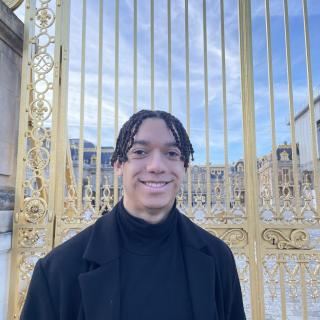IES Abroad: As an undergraduate at the University of Miami (UM), what inspired you to study abroad in Barcelona, Spain? Was this your first time to travel abroad?
Nathan Garrison (NG): Even before my time at UM, I began to develop a fascination with Hispanic culture and the Spanish language. Growing up in Charleston, SC, the thriving Latin American scene in Miami truly felt like a different world, and I was captivated by the exotic sights, smells, sounds and people. I learned to embrace the culture shock and learn from the teachers and elders in a more formal setting as much as the simple moments with people on the street. Those lessons provided as much insight about the new city and its way of life as they did about the place I came from.
I studied abroad for a summer program in Santander, Spain through UM the summer before my time in Barcelona. This was my first time in Europe and the longest I had spent out of the USA. That trip marked the beginning of what I later recognized was a gravitation toward certain types of experiences that felt risky and removed me from my comfort zone. Deepening my skills of the Spanish language, learning to live with a family who spoke no English, navigating the streets, cuisines, pitfalls and pleasures of a foreign city left me wanting more, so I applied for the IES Abroad program in Barcelona for the following spring.
IES Abroad: What is a lasting or meaningful memory you carry with you from your time abroad?
NG: There’s honestly too many to count, spanning the whole range of human emotions. I remember the feeling of arriving there, feeling this intense sensation of otherness, feeling like I didn’t belong to anything and that nothing there belonged to me. By the time I left, I felt the city was a part of me. It still is.
IES Abroad: How has your study abroad experience impacted your life personally and professionally? Did it inspire you to become an entrepreneur?
NG: The experience contributed to my understanding of how to live fully. I believe part of that skill is innate, and part of it is learned. Part of it is simple luck – all the circumstances we can’t control. We have to watch others and interact with people from all walks of life who embody that mentality. No one ever masters it, but there are those that live closer to it, and I believe the common thread between them all is the willingness to take risk. Living abroad taught me lessons about the rewards of taking risk. Much later (well, only seven years!), this foundation contributed significantly to my decision to start my own business, attempting to create something that had never existed. Why we make that choice is just as important as how we achieve it, and my desire to live fully was at the heart of the “why”. Each individual risk that leads to success (or sometimes failure) builds confidence, and each of those enhances our capabilities.
IES Abroad: You are the developer and founder of SharkBanz. Can you tell us a little bit about this new technology?
NG: Our company owns the rights to a variety of different patented technologies designed to deter sharks. We make wearable products to suit all different types of ocean activities that allow everyone from casual beachgoing families to Navy SEALs to reduce the risk of unwanted shark encounters. Our emphases are “simple, affordable, stylish, effective”. These technologies also enable fishermen to reduce shark depredation (when a shark takes a hooked fish before it reaches the boat), and we are working on solutions to reduce shark bycatch in long line fisheries. I’m super excited about the potential to bring commercial products to market that provide simultaneous environmental and economic benefit. One usually leads to loss of the other, but we are in a rare position to add value to both.
IES Abroad: What inspired your creation of SharkBanz, and what experiences or academics prepared you to successfully achieve its development as well as found a new company?
NG: The catalyst for most businesses is solving a problem. In my case, I have a close friend who was attacked by a bull shark when we were in college. Growing up in the ocean my whole life, I was not worried about sharks. His experience made the possibility of an attack real for me. That fear was reinforced when I moved to CA in 2010 and a college student who lived on my street was killed by a great white. I never hesitated to paddle out, but my thoughts were often crowded with images of those horrible attacks. My dad (a former dive instructor) and I began researching technologies that could be implemented to reduce the risk.
At the time, I was working in the creative department of an international footwear company and had exposure to all the steps and processes required to take a product from concept to the shelf at retail. Without that experience, I would not have been able to successfully develop and launch the first version of Sharkbanz.
My business partner, Davis Mersereau, is also an IES Barcelona Alumnus (Fall ’07). We became friends in middle school, and as our personalities and working styles developed, we both sensed there could be some synergy in partnering on a business venture. When I launched Sharkbanz, he was the first to call, and we’ve been an incredible team ever since. We share stories of Barcelona often.
IES Abroad: What advice as you look back on your study abroad experience and your current career, would you share with IES Abroad alumni as they enter the workforce post-graduation?
NG: They’re in a much better position than I was! I graduated in the middle of the financial crisis, so I didn’t even try to get a job. I went to Thailand and taught English. I never would have had the courage to do that without my previous experience with IES Abroad. When I came home, I still couldn’t even get a job working in a restaurant. Unemployment was over 10%, now it’s 3% - the lowest ever. Those first couple of years were tough, but character building. Looking back, I wouldn’t change that experience.
In 2022, people graduating and entering the workforce have the greatest diversity of options that have ever existed. The academic curriculum while in school and the positions offered to graduates are dynamic and rewarding. The massive push towards a more sustainable future in energy, materials, agriculture and finance provides a multi-generational opportunity to find a job where people feel like they can make a difference following their passion. Many of those careers have some element of a prescribed path through the professional or business world, especially for people who understand their passion as it relates to a career. The path I chose did not, so I can’t really give broad advice. But, I love helping young people who specifically don’t know what they want to do find their way.
IES Abroad: What advice would you share with students who are considering studying abroad in the future?
NG: More than a decade later, of the dozens of people I know who studied abroad, I’ve never heard a single person characterize it as anything less than, “one of the best experiences of my life.” So, there’s that. More specifically, think of it as an adventure outside the classroom. If you can tie in something you’re really passionate about academically, that’s icing on the cake. If possible, go to a place that will allow you to learn a new language, even if it feels intimidating. Live with a family, or at least students native to the country. I can’t emphasize that enough. You’ll grow much more from the challenge and have a richer cultural experience. There was a significant divide between people who did and did not live with families in my program. Try to make friends with people native to the city/country. This was hard in Barcelona ’08 because many Spaniards HATED Americans because of Bush and the Iraq war. I was enthusiastically cursed at and spit on in the street multiple times. While infuriating, it showed me that we all have the opportunity to represent our country as individuals and demonstrate to people of other cultures that we are much more alike than we are different. Our class had the chance to change Spaniards’ minds about Americans every time we walked out of the house. It was a powerful realization and a significant responsibility, and I know many of us made a difference. Every IES Abroad student gets to be an ambassador for America, and sometimes there’s no better way to see America than to look back at it from outside its borders.
Learn more about studying abroad in Barcelona, and check out all of our Alumni Spotlights and Alum of the Month profiles to see real examples of how study abroad changed the lives and careers of our past students.
Are you an alumn? Make sure to join our Facebook or LinkedIn groups so you can connect with other Alumni!






